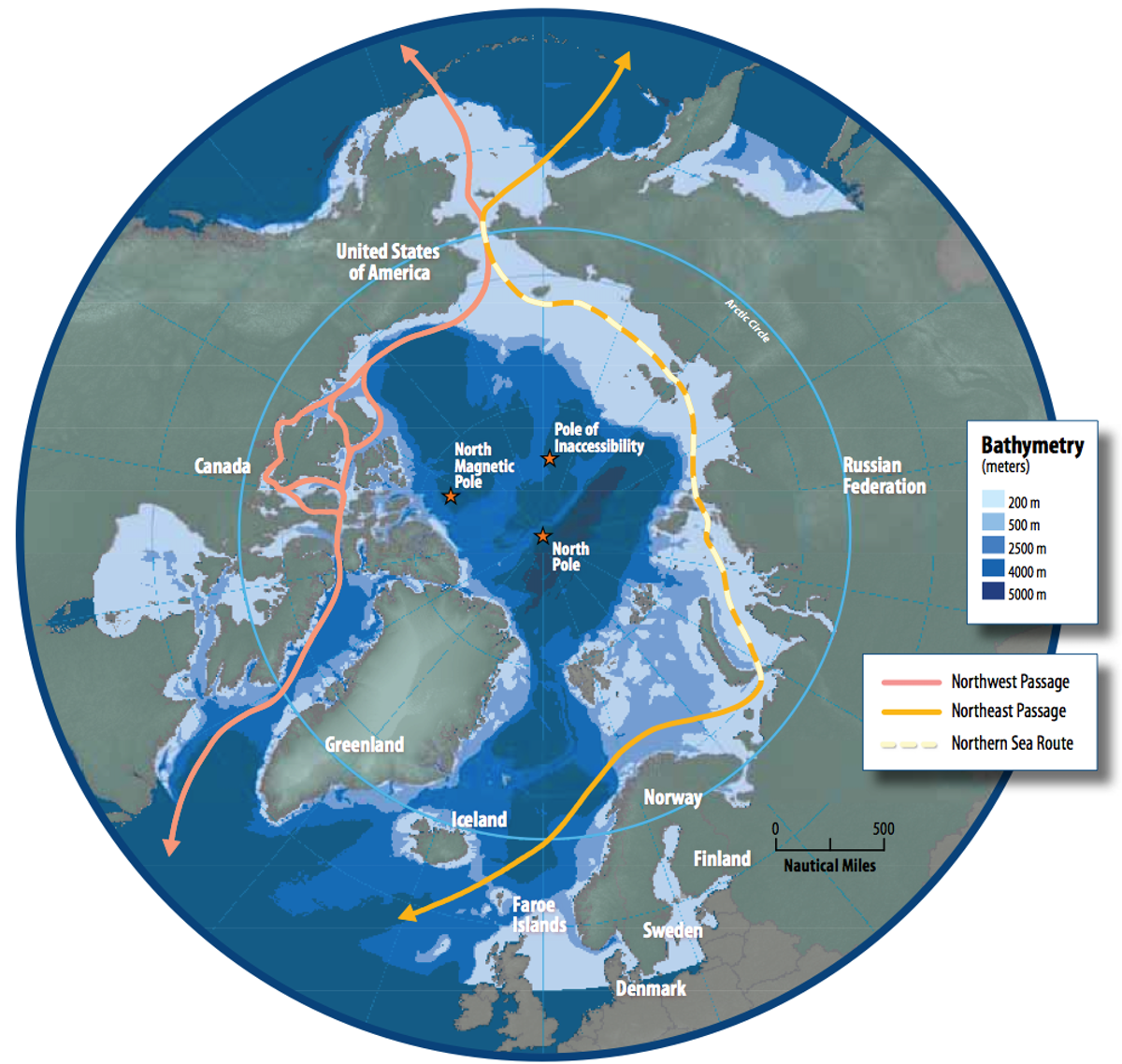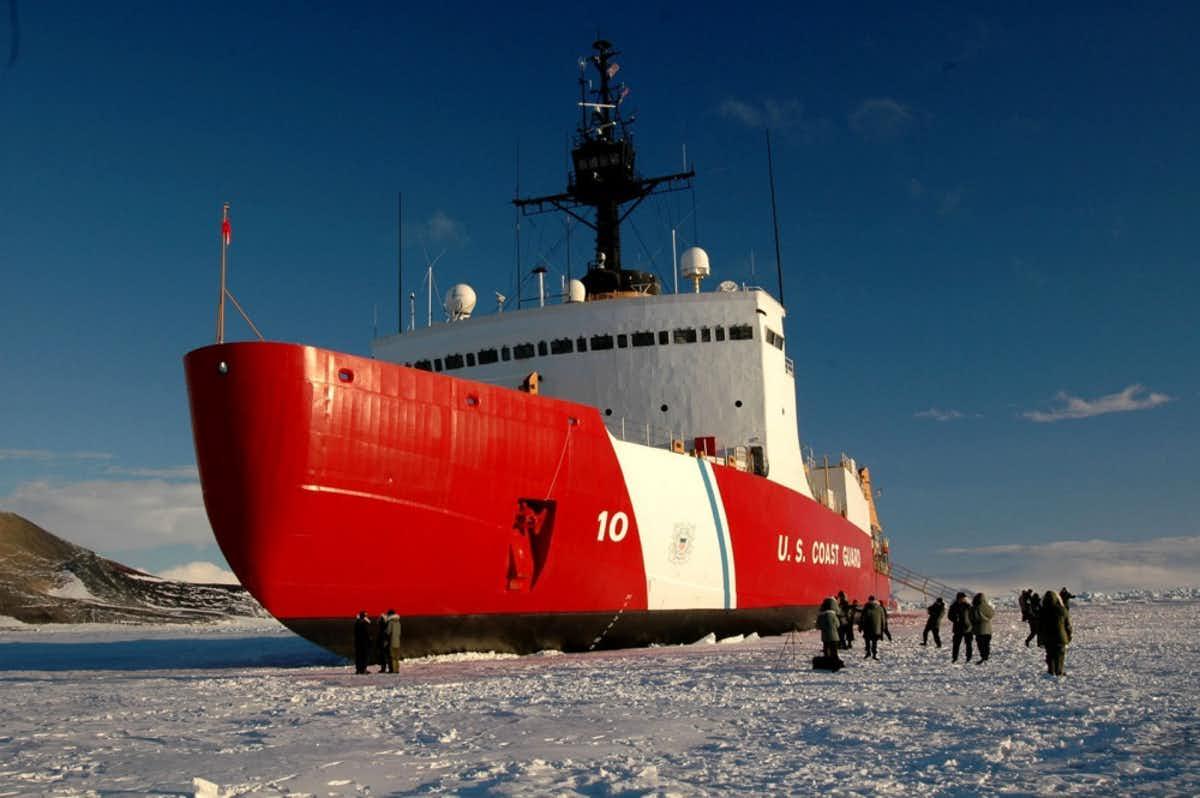Yves here. It’s remarkable to read that the US military has been caught flat-footed with the retreat of Arctic sea ice. They got the global warming memo; various highly respected and widely read experts have been warming of mass migrations and geopolitical destabilization since the early 2000s. The retreat of the polar ice cap and the coming of a Northern passage has also been extremely well covered (cue photos of starving polar bears). Yet the arms merchants missed this selling opportunity? Stunning!
By Rockford Weitz, Professor of Practice & Director, Fletcher Maritime Studies Program, The Fletcher School, Tufts University. Originally published at The Conversation
For decades, the frozen Arctic was little more than a footnote in global economic competition, but that’s changing as its ice melts with the warming climate.
Russia is now attempting to claim more of the Arctic seabed for its territory. It has been rebuilding Cold War-era Arctic military bases and recently announced plans to test its Poseidon nuclear-powered, nuclear-armed torpedo in the Arctic. In Greenland, the recent election ushered in a new pro-independence government that opposes foreign rare earth metal mining as its ice sheet recedes – including projects counted on by China and the U.S. to power technology.
The Arctic region has been warming at least twice as fast as the planet as a whole. With the sea ice now thinner and disappearing sooner in the spring, several countries have had their eyes on the Arctic, both for access to valuable natural resources, including the fossil fuels whose use is now driving global warming, and as a shorter route for commercial ships.
A tanker carrying liquefied natural gas from northern Russia to China tested that shorter route this past winter, traversing the normally frozen Northern Sea Route in February for the first time with the help of an icebreaker. The route cut the shipping time by nearly half.

Russia has been building up its icebreaker fleet for years for this and other purposes. The U.S., meanwhile, is playing catch-up. While Russia has access to more than 40 of these ships today, the U.S. Coast Guard has two, one of them well past its intended service life.
As an expert in maritime trade and Arctic geopolitics, I have been following the increasing activity and geopolitical tensionsin the Arctic. They underscore the need for fresh thinking on U.S. Arctic policy to address emerging competition in the region.
The Problem with America’s Icebreaker Fleet
America’s aging icebreaker fleet has been a persistent topic of frustration in Washington.
Congress put off investing in new icebreakers for decades in the face of more pressing demands. Now, the lack of polar-class icebreakers undermines America’s ability to operate in the Arctic region, including responding to disasters as shipping and mineral exploration increase.
It might sound counterintuitive, but diminishing sea ice can make the region more dangerous – breakaway ice floes pose risks both to ships and to oil platforms, and the opening waters are expected to attract both more shipping and more mineral exploration. The U.S. Geological Survey estimates that about 30% of the world’s undiscovered natural gas and 13% of undiscovered oil may be in the Arctic.

The U.S. Coast Guard has just two icebreakers to manage this changing environment.
The Polar Star, a heavy icebreaker that can break through ice up to 21 feet thick, was commissioned in 1976. It is usually posted to Antarctica in the winter, but it was sent to the Arctic this year to provide a U.S. presence. The crew on the aging ship has had to fight fires and deal with power outages and equipment breaks – all while in some of the most inhospitable and remote locations on Earth. The second icebreaker, the smaller Healy, commissioned in 2000, suffered a fire on board in August 2020 and canceled all Arctic operations.

Congress has authorized construction of three more heavy icebreakers at a total cost of around US$2.6 billion and has funded two of them so far, but they take years to produce. A shipyard in Mississippi expects to deliver the first by 2024.
An Icebreaker Solution
One way to add to the icebreaker fleet would be to have allies jointly procure and operate icebreakers, while each still builds up its own fleet.
For example, the Biden administration could collaborate with NATO allies to create a partnership modeled on NATO’s Strategic Airlift Capability of C-17 airplanes. The airlift program, started in 2008, operates three large transport planes that its 12 member nations can use to quickly transport troops and equipment.
A similar program for icebreakers could operate a fleet under NATO – perhaps starting with icebreakers contributed by NATO countries, such as Canada, or partner countries, such as Finland. Like the Strategic Airlift Capability, each member country would purchase a percentage of the shared fleet’s operating hours based on their overall contributions to the program.
Using the Law of the Sea
Another strategy that could boost U.S. influence in the Arctic, buffer looming conflicts, and help clarify seabed claims would be for the Senate to ratify the United Nations Convention on the Law of the Sea.

The Law of the Sea took effect in 1994 and established rules for how the oceans and ocean resources are used and shared. That includes determining how countries can claim parts of the seabed. The U.S. initially objected over a section that limited deep seabed mining, but that section was amended to alleviate some of those concerns. Presidents Bill Clinton, George W. Bush and Barack Obama all urged the Senate to ratify it, but that still has not happened.
Ratification would give the U.S. a stronger international legal position in contested waters. It also would enable the U.S. to claim more than 386,000 square miles – an area twice the size of California – of Arctic seabed along its extended continental shelfand fend off any other country’s overlapping claims to that area.
Without ratification, the U.S. will be forced to rely on customary international law to pursue any maritime claims, which weakens its international legal position in contested waters, including the Arctic and the South China Sea.
Relying on International Cooperation
The Arctic has generally been a region of international cooperation. The Arctic Council, an international body, has kept eight countries with sovereignty over land in the region focused on the Arctic’s fragile ecosystem, the well-being of its Indigenous peoples, and emergency prevention and response.
Over the past few years, however, “near-Arctic” countries, including China, Japan, South Korea, Britain and many European Union members, have become more engaged, and Russia has become more active.
With the rising tensions and expanding interest in the region, the era of cooperative engagement has started to recede with the melting sea ice.


Addressing this would require real R&D.
So now we know the MIC has hollowed itself out like the rest of US industry.
Easier to sell the crap you already sell with software patches than to actually address a threat.
The Arctic Ocean is a Russian lake.
Nice to see NATO still looking for a raision d’etre (and of course they can help pick up the tab)
https://patrickarmstrong.ca/2020/12/21/the-arctic-ocean-is-a-russian-lake/
When I heard about this, my mind recalled the curious statement Trump made in 2019 about wanting to buy Greenland.
https://www.npr.org/2019/08/19/752274659/no-joke-trump-really-does-want-to-buy-greenland
This, of course, is the key paragraph. If the US signed up to international agreements on maritime matters, it would have a legitimate interest in insuring that they were adequately policed. But without that, the US only has a legitimate interest in that part of the arctic around Alaska.
In an ideal world of course, both Poles would be declared world reserves and no commercial exploitation of any kind would be permitted. There is a chance of that with Antarctica, but I doubt Russia and Canada, let alone the other countries with a claimed interest, would be interested.
Indeed, it’s clear from the story that this isn’t a problem with the US Navy, but with the US political system itself, and its disinclination to fund such boring but useful capabilities.
There. Fixed it for ya.
The US has missed the boat on the Arctic, too late to the game, not equipped well enough to play and the cost of doing so is now way beyond even their money printing capabilities. Hence the suggestion to give NATO something to do – and help split the cost. The Russians have already sailed two mobile nuclear power stations up there. As with most other things the West has been gazing in the mirror at itself for far too long, enamoured of it’s own appearance and the constant flow of ‘sculpted narratives ‘ about who we are and what we do. Problem is when these narratives abutt reality we’re left speechless by our own incompetence. Cognitive dissonance is the Wests biggest issue, that and the inability to recall which of our myths and stories are anchored in any truth. The Russians and the Chinese? They just get on with it, no need for narratives or silly little stories, just the job to be done and the problems to be solved.
https://patrickarmstrong.ca/2020/12/21/the-arctic-ocean-is-a-russian-lake/
The Law of the Sea is a key paragraph, but I was wondering what the perceived downsides to the US may be? The US Senate generally has not ratified any sort of major treaty in recent decades. According to wikipedia,
Not ratifying the LOS treaty allows the US to do as it pleases, doesn’t it ? Who adjudicates disputes with a non-party? Seems like the US non membership in the ICC.
Perhaps the US wants a nine dashed line extending to the Eurasian shore? While the Arctic shore of Alaska is huge, Russia’s dwarfs the US.
one downside for usians would be admitting institutionally that global warming is real.
It is worth emphasizing what you point out at the end: the US has been accusing China of violating UNCLOS, but refuses to join it.
MIC should repurpose the balsawood Littoral Combat Ships as ice breakers and fund a $100 billion upgrade program to fit skis on F35s. Better get cracking or the Arctic will melt out before that path becomes obsolete, requiring another round of repurposing sole-source cost-plus contracts. Our boys in white camo deserve equipment made in as many congressional districts as possible.
As best I can tell, the problem described by the writer of this article, is the need of “countering” Russia having more artic toys than we do, and nobody has caused any military conflicts or serious confrontations amongst nations because she has too many toys all for herself, or how she is peacefully conducting her business along with others only because she has more toys than they do, who have fewer toys, and we don’t have a NATO force to inject ourselves in the Arctic so we can decide there should be something to disagree about which at present we don’t have but need to find, so we can have confrontations with Russia and so “counter” her.
And if we don’t? Then Russia and other nations we don’t like will continue to become “active” in the area.
The situation of US ice-breakers is so dire at the moment that they are loath to send their working ice-breaker too far north. The reason is that if it breaks down, then almost certainly they would have to call for help from a Russian ice-breaker and that is something that nobody in Washington wants to see happen. Sad this when you reflect that once both powers could cooperate on all sorts of even prosaic things-
https://en.wikipedia.org/wiki/Operation_Breakthrough
Screw “countering Russia”. What would really be nice is if the US led the world in reversing global warming so the damn Artic could freeze back up again.
Otherwise the whole thing is just rats fighting over cheese on the Titanic.
When you consider how much gas and oil could be found all over the Ice Free Arctic, once the Arctic becomes Ice Free all the year round, you can see why some major countries want to keep the global warming going. ( While trying to fake a plausibly-believable desire to prevent the further warming they actually want).
The ice is melting so we need ice-breakers for LNG tankers to accelerate the melting??
Ice mass lost, 475 billion tons per annum in the 2010’s / up from 81 billion tons of ice in the 1990’s, is being ignored by every major country. The distinct possibility of collapsing glaciers, Antarctica’s Thwaites and Pine Island, discovered recently to be melting at key points that anchor it to land could take down the entire West Antarctica Ice Sheet. Observations “show warm water impinging from all sides on pinning points critical to ice-shelf stability, a scenario that may lead to unpinning and retreat”. Journal of Scientific Advances 04/09/2021. The Doomsday Glacier Lives up to its Billing
So in other words, the entire ice-shelf could detach and then flow into the ocean; best estimate a ten foot sea rise. I think building more ice breakers to pillage the once frozen Arctic will be the least of the worlds concern.
https://www.counterpunch.org/2021/04/20/the-doomsday-glacier-lives-up-to-its-billing/
Yes. So we can drill for gas and oil all over a newly freed-up iceless Arctic.
Or maybe it doesn’t need to be a competition to rape and pillage the land and we could cooperate instead and just leave the place alone. Just planting seeds….
That’s exactly the post I was about to make. But we mopes know in our hearts that there is wealth, untold wealth I tells ya, to be ripped from the post-cold Arctic! Same story with the bottoms of the oceans, as “technology” ramps up to first map and lay claims to the sea bottom, the last real commons, and start scooping up all those manganese nodules and other pennies from Heaven…
And so it goes…
My favorite line in the whole hand-wringing “we have an ice-breaker gap” article:
“Congress put off investing in new icebreakers for decades in the face of more pressing demands.”
“More pressing demands” such as spending trillions on aircraft carries, crappy but expensive weapon systems, invasions, occupations and/or ‘color revolutions’/putsches — in every other country in the world.
Oh. And funneling trillions of shiny gifts to corporations and ‘our’ oligarchs as they deindustrialized the country and turned it into a neoliberal killing field for the 99% — just so the billionaires could fatten up a little bit more.
As to global warming, we really need not worry: if the ‘deep-thinkers’ in the Biden Administration can gin up a nuclear exchange with Russia then we should have a pleasant cooling from a subsequent nuclear winter — at least for a few years. Killing two birds with one stone so to speak. And that’s certainly the kind of creative thinking we should expect from ‘our’ ruling class in DC.
https://www.livescience.com/nuclear-winter-disaster.html
It’s apparently an open question whether a nuclear war would result in cooling, or rather an acceleration of the heating of the atmosphere. https://climate.nasa.gov/news/483/how-would-nuclear-war-affect-the-climate/
The smart thing is not to do it. But humans, especially Imperial overlords and oligarchs, seem not to be very smart, taking advice from sh!theads of bad faith who get to advise them by concentrating on slipping into such positions of “trust” and power.
That NASA link is very short and confusing. The interviewee says black carbon can cause atmospheric warming, but his actual modeling of 100 Hiroshima-size bomb blasts leads him to conclude that global temperatures would fall by 1 degree centigrade.
So he suggests there might be global warming and then concludes that yes, there would be global cooling. This is called agnotology.
His choice of Hiroshima-size bombs also makes his modeling irrelevant. The Hiroshima bomb was equivalent to 18,600 tons of TNT and killed almost 200,000 people (including radiation effects). The average explosive value of the 7,200 nuclear bombs currently in the US inventory is around 100,000 tons of TNT.
Concerning the so-called “ice breaker gap” the reason Russia has so many icebreakers is because its ports in the Baltic and Far East freeze over in winter and ice breakers are needed to keep them open. In sum, Russia has so many icebreakers because of its geographical location, not because it wants to project power in the Arctic Circle.
It would be incredibly stupid for the US to embark on closing this ice breaker gap. We, unlike the Russians, have mostly warm water ports that don’t freeze over in winter.
Please don’t try to confuse the matter with facts; it undermines the premise driving the discussion, and is an inconvenience.
The US appears to be incapable of planning.
All it has is retaliation.
And massively expensive catch up response.
I don’t believe it is incompetence, but a structural problem with the its complex layers (City, State and Federal) of Governance, coupled with massive greed when the pigs come to feed from the emergency response trough.
I never thought of it that way but it is logical. There is infighting going on from towns to states to D.C. That we didn’t sign the LOS because it wasn’t “market friendly” won’t be our excuse going forward.
The LOST (Convention, actually, but I like this acronym better) is kind of like the agreements between Spain and Portugal and Britain over who gets to loot which geographic areas. Or the carving up of China. Or the dispute between Japan and the US Empire over who gets to control Asia and the Pacific. Nothing much in there that is about preserving a livable planet.
The author seem to have no knowledge of geography or little interest in looking at the maps.
Several realities to point to: The northeastern passage is within Russian economic zone and under Russian control/jurisdiction. The Law of the sea does stipulate that the littoral waters between the shore and the ice shelf are under the jurisdiction of the littoral country.
The “competition” in the Arctic is just the fact that Russia has the means and the legal rights to encourage, protect, and regulate as it wishes the commerce through the northeastern passage and US can’t do jack about it.
That is a smack in the face to the would be hegemon and a refutation to the claimed hegemony.
Should we buy Canada, then? Asking for a friend.
The US cannot afford ice-breakers, how can they afford to “purchase” the second largest country in the world?
And even if a union were to ever be established (pthew, pthew, pthew), how would that solve the impasse the US is in? That of wanting to control everything and thus extract a “fee” and inability to do so because of material, political and legal constraints – the over abused idea of international liberal rules based order moniker cannot be employed in this case, and the good old term of gunboat diplomacy is not politically correct.
I propose a merger with Canada. We can be in charge of hegemony and they can be in charge of health care.
Can we extend I-29 up to Nunavut? Never been there is all, bucket list thing, although I met some nice teachers from there who had flown into Yellowknife for a conference.
So the US should become active in the Arctic Ocean region because Russia is up there doing stuff? Sounds like the author has accepted Cold War 2.0 logic and is advocating a tit for tat competition with the Russians.
Has he looked at a map and compared the length of America’s Arctic coastline to Russia’s? Maybe that’s why they are more active in that region than the US.
Even NC’s headline that the US “isn’t prepared to counter Russia” in the Arctic implies that we ought to get our sh*t together and do just that. American exceptionalism and the twisted logic of “countering” our “adversaries” no matter what and where they exert influence is a tough beast to kill.
It makes a certain amount of sense for the US to be active along the Alaskan coastline but framing it as a “because Russia” issue buys into zero sum cold war logic. I doubt the author would be wringing his hands over US “inferiority” in the Arctic if Canada or Denmark were sending more ice breakers into the region and exploring potential undersea oil and gas deposits there.
Besides, isn’t opening up the Arctic Ocean to marine traffic and intense resource extraction activities supposed to be terrible for the eco system up there? But hey, if we can pretend climate change isn’t a thing than we can also ignore all the other damage human activity is causing on the earth.
I’ve come to hate container vessel shipping. It’s the absolute worst form of transport, and the whole Suez blockage confirmed its outdatedness. A new type of vessel needs to be created, and I nominate that odd vestige of Cold War transport pioneered by Russia: The Ekranoplan! (via Wikipedia)
I propose the development of fleets of super class Ekranoplan aircraft for shipping. Flying at low altitude just above the water/ice, they would cover great distances in an order of magnitude less time. The Russians should work with the Chinese on electric jet engine technology (via interestingengineering.com). The west sees Green Tech as a threat to financialized fossil fuel hegemony, and western interests will lose the green tech race to the China and others who are not beholden to big finance interests. Shipping could remain ocean bound (Atlantic or Pacific/Indian) with new arctic routes accommodating rapid ferrying of goods across the divide for trans-shipment by water vessels. Still not ideal IMO, but better.
Today’s crazy idea, brought to you by the letter “C” … ;-)
Someone pleeeeeeeeease do it … ;-) (via YouTube)
” Could a machine much larger than even the KM, be the key to unlocking the technology’s potential? A machine that would fly 10 or 20 meters above waves, could transverse oceans, and potentially carry passengers and cargo far more efficiently than any aircraft.”
American domestic politics on fossil fuel exploration and Arctic warming make it very unlikely that there will be any near-term economic development of the U.S.’s potential Exclusive Economic Zone off northern Alaska. The most recent efforts (A BP artificial island and test drilling a decade ago and some Trump-era sales of drilling rights) have not been followed up by people with money.
So there is no powerful U.S. constituency for spending money on large icebreakers. The Russian and Canadian claims as the stand don’t seem to overlap with the potential U.S. claims.
Tortured analogy time:
Mother Nature is lying unconscious inside her burning house, the Earth.
The fire truck arrives and out jump firemen from Canada, Russia, and the US, wearing logos of oil companies. They rush into the burning house and stand around arguing about who gets to fuck her first.